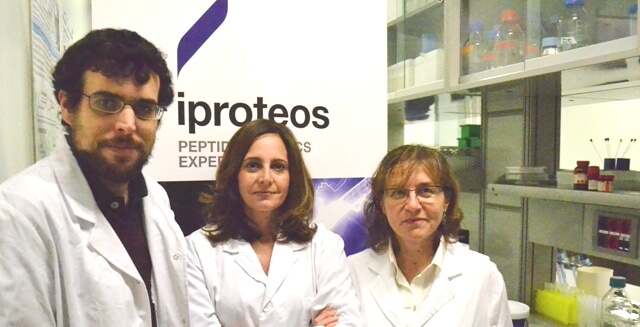
A public-private project to treat atherosclerosis led by Iproteos receives € 700,000
A public-private consortium led by the biotech Iproteos - based at the Barcelona Science Park (PCB)– with the participation of the Biomedical Research Institute of Barcelona (IIBB) belonging to the Spanish National Research Council (CSIC) and the Centre for Genomic Regulation (CRG), has launched a project to validate a new family of compounds for the treatment of cholesterol vascular accumulation associated with atherosclerosis. The project has just received a grant for 700,000 Euros from the Ministry of Economy, Industry and Competitiveness, through the 2016 Retos-Colaboración call under the scope of the National Programme for Research Aimed at the Challenges of Society (Exp. RTC-2016-5078-1).
The lipid accumulation in the vascular wall and in the myocardium has a great clinical impact because it causes serious cardiovascular alterations in pathologies such as atherosclerosis, which is highly prevalent in our society. Specific treatments are urgently needed to counteract the mechanisms that lead to this condition, as it is an unmet medical need.
The final objective of the project is the validation of a new family of peptidomimetics compounds (peptide derivatives with optimized properties) that are drug candidates for the treatment of cholesterol vascular accumulation associated with atherosclerosis. Within parallel to the efficacy trials, pharmacokinetic and pharmacodynamic bioavailability studies will also be carried out, which will provide vital information for the project to reach clinical phases.
Cardiovascular diseases (CVDs) are the number 1 cause of death globally, and uncontrolled cholesterol accumulation in the vascular wall and myocardium is closely related to CVDs. The World Health Organization (WHO) estimates that in 2012, 17.5 million people died from CVDs in 2012, representing 31% of all global deaths.
New generation drugs for the treatment of cardiovascular diseases
The experimental findings of the Lipids and Cardiovascular Pathology group (LipidCardio) at IIBB-CSIC, associated to the IIB-SantPau research center, showed that one of the key mechanisms in the accumulation of cholesterol in vascular and myocardial tissue is the regulation of the LRP1 receptor. Subsequently, through the application of IPROTech, Iproteos´s propietary technology, this biotech developed a new family of LRP1 receptor modulating-peptidomimetics with great potential for the treatment of cardiovascular diseases.
Now, within the framework of this project, Iproteos will design and synthesize the new peptidomimetic compounds while the LipidCardio group of IIBB-CSIC and IIB-SantPau will be in charge of the evaluation of its therapeutic efficacy in atherosclerosis; and the Proteomic Unit CRG/UPF will further study the mechanism of action of these new drug candidates in vascular disorders by means of mass spectrometry techniques.
“The field of cardiovascular disease is of great relevance, given its prevalence and the predictions that define it as one of the great pandemics affecting developed countries. It is a large market where there are no treatments to prevent the uncontrolled cholesterol accumulation in the vascular wall and myocardium. To meet this need, with our IPROTech platform, we have been able to design and produce peptidomimetic drug candidates, capable of reaching the precise place where they have to carry out their action, thanks to their optimized properties of permeability and bioavailability”, says Teresa Tarragó, CEO of Iproteos
“Our research group develops its highly translational activity in the clinical area of the Santa Creu i Sant Pau Hospital. Our main objective is the development of new clinical tools that improve the diagnosis and treatment of patients with cardiovascular disease. With this particular project, we intend to develop a new therapeutic strategy for the prevention and treatment of atherosclerosis. Unlike current therapies, which target blood cholesterol, the treatment we are developing targets the lipid accumulation in the arteries, which is directly associated with cardiac events such as acute myocardial infarction”, explains Dr. Vicenta Llorente-Cortés, director of the LipidCardio IIBB-CSIC and IIB-SantPau research group.
“The objective of our unit is to provide services in the field of proteomics to CRG´s internal and external users and to develop quantitative techniques based on mass spectrometry to make proteomics a robust, sensitive and precise method that allows, not only the generation of new research hypotheses, but also validation in complex biological systems. In this project, through mass spectrometry, we aim to determine the changes that occur at molecular level within the cell by the action of this new family of drugs for the treatment of cardiovascular diseases, and by this, advance in the knowledge of its mechanism of action”, further explains Dr. Eduard Sabidó, head of CRG-UPF’s Proteomics Unit.
Members of the consortium expect the results of this project to be the validation of a first-in-class drug candidate for the treatment of atherosclerosis, including a detailed study of its mechanism of action. This will subsequently enable the fulfillment of regulatory preclinical trials and, and will later on, the first-in-humans studies.




